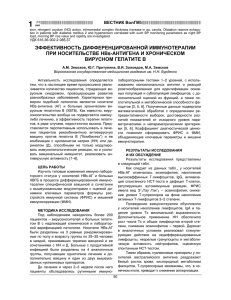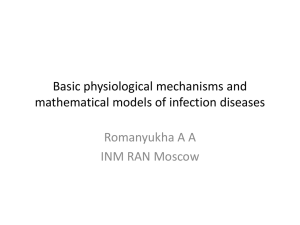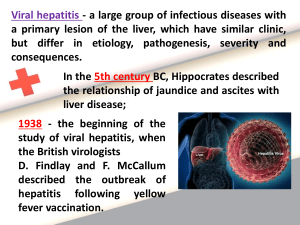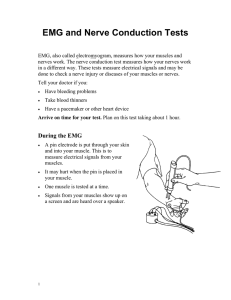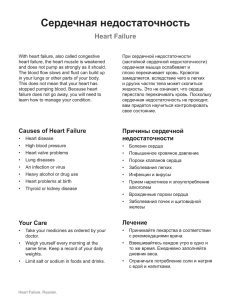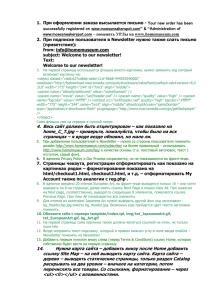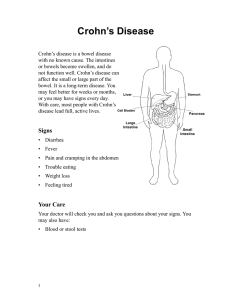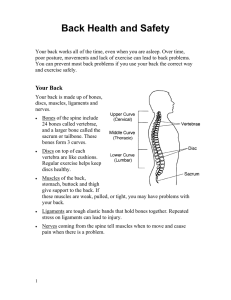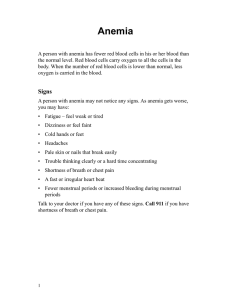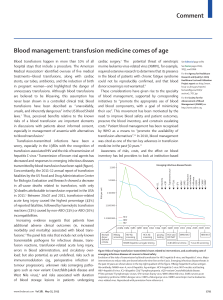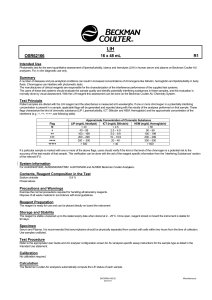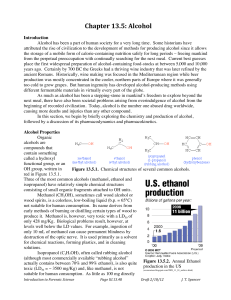Печень
advertisement

“DIFFERENTIAL DIAGNOSIS AT THE JAUNDICE. MODES OF THE GENERAL PRACTITIONER” PREVENTION LECTOR: DOCENT NURILLAEVA N.M. Anatomy Jaundice Someone with jaundice is likely to have a yellow look to their skin and the whites of the eyes. Many newborn babies develop jaundice, but the condition can affect people of all ages. This article looks at older children and adults. Jaundice is caused by a build-up of bilirubin in the blood and body tissue. That build-up is often due to conditions affecting the liver, such as cirrhosis, hepatitis or gallstones. If someone shows signs of jaundice, doctors will look to treat the condition that's causing it rather than jaundice itself. If you have signs of jaundice, seek medical advice. Symptoms of jaundice As well as the classic yellow tinge to the skin and whites of the eyes, someone with jaundice may also have yellowing of mucous membranes in the mouth and nose. Stools (faeces or poo) can be pale in colour and urine dark in colour. Some underlying conditions, which lead to jaundice, may feel like flu, and may also result in fever, chills, stomach pain, itching or weightloss or be without an explanation such as a diet. Causes of jaundice When red blood cells break down naturally in a 120day cycle, bilirubin is produced as a waste by-product. The journey bilirubin takes out of the body's waste disposal systems takes it carried by blood to the liver. There is it combined with bile (digestive fluid) from the gallbladder. Infections or damage can disrupt this process, leading to jaundice. This mixture exits the body through faeces and urine. If everything is working well, faeces should be brown and urine light yellow. Pre-hepatic jaundice If an infection or medical condition makes the red blood cells break down sooner than usual, bilirubin levels rise. This is known as pre-hepatic jaundice. Conditions which may trigger this include malaria, sickle cell anaemia, thalassaemia, Gilbert's syndrome, hereditary spherocytosis and Crigler-Najjar syndrome. Intra-hepatic jaundice If the liver is damaged, it may be less able to process bilirubin. This causes what doctors call intra-hepatic jaundice. The liver damage may be a result of causes that include hepatitis, alcoholic liver disease, glandular fever, liver cancer, illegal drug use including ecstasy, and paracetamol overdose. Obesity and non-alcoholic fatty liver disease can be a cause of cirrhosis of the liver and jaundice. Eating a high-fat diet can raise your cholesterol levels and increase the risk of having gallstones. Post-hepatic jaundice Gallstones, pancreatitis, pancreatic cancer and cancers of the gallbladder or bile duct may also disrupt the bilirubin removal process leading to jaundice. This is called post-hepatic jaundice. В ЗАВИСИМОСТИ ОТ ЭТИОЛОГИЧЕСКИХ ФАКТОРОВ РАЗЛИЧАЮТ Гемолитическую (надпеченочная) Печеночная Подпеченоч ная Конституциональная Чрезмерное разрушение эритроцитов и повышенная выработка билирубина Нарушения улавливания клетками печени билирубина и связывания его с глюкуроновой кислотой Наличия препятствия к выделению билирубина с желчью в кишечник и обратного всасывания связанного билирубина в кровь Jaundice diagnosis The yellowing of skin and eyes are likely to be the main clues a doctor will use before confirming a jaundice diagnosis. A person will be asked about other symptoms and risks, such as foreign travel or illegal drug use. A physical examination will be carried out to look for signs of swelling of the liver and legs, ankles or feet which might indicate cirrhosis of the liver. Urine can be tested for urobilinogen, which is produced when bilirubin is broken down. Finding high or low levels can help pinpoint the type of jaundice. Blood tests may be used to check for conditions like malaria or hepatitis. Существуют два основных вида рака печени. Опухоли, исходящие из клеток самой печени, называются гепатомами Опухоли, образующиеся в желчных протоках Холангиокарцинома Локализуются внутри печени Карцинома желчных протоков Локализуются в части протока за пределами печени Проявления рака печени При первичном и вторичном раке печени наблюдаются одинаковые симптомы Диагностика в начальных стадиях очень трудна Важный симптом Длительные боли (неприятные ощущения) в правом подреберье Быстрое похудание Часто первым признаком бывают ощущение дискомфорта и, возможно, вздутие в верхней части живота, вызванные увеличением печени. Часто характеризуется лихорадкой неясной этиологии Признаки общего недомогания - чувство усталости, утрата аппетита, тошнота, снижение массы тела Увеличение печени; она становится довольно плотной и при надавливании болезненной A liver function blood test may indicate hepatitis, cirrhosis or alcoholic liver disease. Sometimes a liver biopsy - removal of small tissue sample - is needed to confirm or rule out conditions such as cirrhosis or liver cancer. Doctors may also need to look inside the body for problems with the liver or bile duct using ultrasound, X-ray with contrast, MRI or CT scans. Объективный осмотр Общие симптомы желтуха выпадение волос на туловище лихорадка Ангина инфекционный мононуклеоз Увеличение лимфоузлов инфекционный мононуклеоз Печень увеличение или уменьшение Увеличенный желчный пузырь рак головки поджелудочной железы Тремор болезнь Вильсона алкогольный цирроз печени Покраснение, одутловатость лица алкоголизм Увеличение околоушных желез Сосудистые звездочки Расчесы холеостаз Гинекомастия Спленомегалия Расширение вен передней брюшной стенки цирроз печени Покраснение ладоней ТАКТИКА ВОП ПРИ ЖЕЛТУХЕ Ранняя диагностика основной причины Консультация узкого специалиста согласно квалификационной характеристики ВОП (I или II категория) Осуществление профилактических мер, а также при необходимости медикаментозное лечение совместно с узкими специалистами Диспансерное наблюдение и реабилитация (IV категория) ЛАБОРАТОРНО-ИНСТРУМЕНТАЛЬНОЕ ИССЛЕДОВАНИЕ При подозрении: 3.2. категория Вирусные гепатиты Для исключения вирусной этиологии хронического гепатита или цирроза печени Хронические гепатиты Цирроз печени -маркеры вирусов гепатита, -АСТ --фракции билирубина - необходимо обследование на маркеры вирусов гепатита В (НВs Ag, HВe Ag, анти HBS Ag, анти Hbe Ag) и С (анти - НСА). - АСТ, ЛДГ и фракции билирубина - кровь на белковый спектр - коагулаграмма - УЗИ печени, желчного пузыря и селезенки -Сулемовая и тимоловая пробы -Щелочная фосфатаза 3.1. категория - общий анализ крови, мочи и кала - АЛТ ЛАБОРАТОРНО-ИНСТРУМЕНТАЛЬНОЕ ИССЛЕДОВАНИЕ При подозрении: 3.2. категория Холедохолитиаз Рак поджелудочной железы Гемолитические анемии Рак печени -УЗИ -холангиография или радиоизотопное исследование - УЗИ поджелудочной железы - КТ или МРТ - АСТ, ЛДГ и фракции билирубина - УЗИ печени и селезенки - УЗИ печени -КТ или МРТ -Пункционная биопсия 3.1. категория - общий анализ крови, мочи и кала - АЛТ Консультация гематолога Спленоэктомия (при наследственном микросфероцитозе ) Гемолитические анемии дезинтоксикационная терапия Глюкокортикостероиды (аутоиммунная гемолитическая анемия) витамин Е (наследственный стомацитоз ) Консультация инфекциониста изоляция Острые гепатиты дезинтоксикационная терапия Глюкокортикостероиды (при тяжелых течениях – гепатиты В, Д) Диета Консультация гепатолога гепатопротекторы Хроинические гепатиты дезинтоксикационная терапия Противовирусные препараты Глюкокортикостероиды Диета Консультация гепатолога гепатопротекторы Цирроз печени дезинтоксикационная терапия Глюкокортикостероиды Диета Консультация онколога химиотерапия Рак головки поджелудочной железы Оперативное лечение Лучевая терапия Принципы ведения и диспансерного наблюдения больных с ЖЕЛТУХОЙ в условиях СВП или семейной поликлиники Консультация по ведению здорового образа жизни Обучение больного принципам самоконтроля Мониторинг уровня БИЛУРУБИНА, ТРАНСАМИНАЗ (гепатиты) УЗИ мониторинг Мониторинг уровня гемоглобина (гемолитические анемии) Мониторинг индекса массы/тела Психологическая поддержка (опухоли) Своевременная диагностика и профилактика осложнений Контроль над последствиями фармакотерапии Периодические клинические осмотры • • • • Preventing jaundice Due to the wide range of potential causes, it's not possible to prevent all cases of jaundice. However, there are four main precautions that you can take to minimise your risk of developing jaundice. They are: ensuring that you stick to the recommended daily amount (RDA) for alcohol consumption maintaining a healthy weight for your height and build if appropriate, ensuring that you're vaccinated against a hepatitis A or B infection, which are more common in certain parts of the world compared to England; therefore, vaccination would usually only be recommended depending on where in the world you're travelling (see below) minimising your risk of exposure to hepatitis C because there's currently no vaccine for the condition; in England, the most effective way of preventing hepatitis C is by not injecting illegal drugs, such as heroin, or making sure that you don't share drug injecting equipment if you do More information about each precaution is provided below. • • PREVENTING JAUNDICE Alcohol Giving up drinking alcohol altogether is the most effective way of reducing your risk of developing jaundice, particularly if you've been drinking for many years. As a minimum preventative measure, stick to the recommended daily amounts for alcohol consumption. The recommended daily amounts are: 3-4 units a day for men 2-3 units a day for women A unit of alcohol is approximately equal to half a pint of normal-strength lager, a small glass of wine or a single measure (25ml) of spirits. Many experts would recommend that as well as sticking to the recommendation daily amounts, you also spend 2-3 days not drinking any alcohol. Visit your GP if you're finding it difficult to moderate your alcohol consumption. Counselling services and medication are available to help you reduce your alcohol intake. See Alcohol misuse - treatment and Alcohol for more information and advice. Preventing jaundice Maintaining a healthy weight Obesity and the resulting damage it can sometimes cause to the liver (non-alcoholic fatty liver disease) is an often-overlooked cause of cirrhosis (scarring of the liver) and jaundice. Therefore, achieving and maintaining a healthy weight is an effective way of preventing jaundice. In addition, a diet that's high in fat can increase your blood cholesterol level, which in turn will also raise your risk of developing gallstones. The most successful weight loss programmes include at least 150 minutes (2 hours and 30 minutes) of moderate-intensity aerobic activity (i.e. cycling or fast walking) every week, eating smaller portions and only having healthy snacks in between meals. A gradual weight loss of around 0.5kg (1.1lbs) a week is usually recommended. Read more about the treatment of obesity and losing weight safely. • • • Preventing jaundice Hepatitis A and Hepatitis B As both hepatitis A and hepatitis B are relatively uncommon conditions in England, vaccination is usually only recommended if you're travelling to parts of the world that are known to have high levels of both conditions. You may also be advised to have a vaccination if your job or lifestyle increases your risk of exposure to either type of virus. For example, vaccination for hepatitis A is recommended for: people who are travelling to places where the virus is common, such as the Indian subcontinent, Africa, central and south America, the Far East and eastern Europe people who work in laboratories people who work with primates, such as monkeys and chimpanzees Vaccination for hepatitis B is recommended for: visitors to parts of the world where hepatitis B is widespread, such as south-east Asia, sub-Saharan Africa and the Pacific Islands, such as the Hawaiian Islands those who regularly inject drugs; men who have sex with men; sex workers See the topics about Hepatitis A - Prevention and Hepatitis B - Prevention for more information and advice. Preventing jaundice Hepatitis C If you regularly inject drugs, such as heroin, the best way to avoid getting a hepatitis C infection is to not share any of your drug-injecting equipment with others. This doesn't just apply to needles but also to anything that could come into contact with other people's blood, such as: mixing spoons; filters; water used to dissolve drugs; tourniquets – the belt that drug users sometimes tie around their arm to make their veins easier to inject As hepatitis C doesn't cause any noticeable symptoms for many years, many people may not realise that they're infected. It's therefore safer to assume that anyone may have the infection. Even if you're not a drug user, it's important to take some common sense precautions to minimise your exposure to other people’s blood, such as avoiding sharing any object that could be contaminated with blood, such as razors and toothbrushes. PREVENTING JAUNDICE There's less risk of developing hepatitis C by having sex with someone who is infected, but as a precaution it's recommended that you use a barrier method of contraception, such as a condom. It may also be possible to get hepatitis C by sharing banknotes or ‘snorting tubes’ with an infected person to snort drugs, such as cocaine or amphetamine. These types of drugs can irritate the lining of the nose, and small particles of contaminated blood could be passed on to the note or tube, which you could then inhale.
